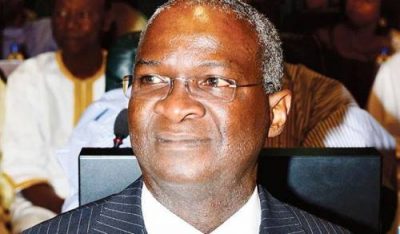Fashola, power firms oppose bill to criminalise estimated billing
The Minister of Power, Works and Housing, Mr. Babatunde Fashola, and the Nigerian Electricity Regulatory Commission on Tuesday opposed the move by the House of Representatives to criminalise estimated billing by electricity distribution companies in the country.
All the Discos, represented by the Association of Nigerian Electricity Distributors, also kicked against the bill.
The House Committee on Power opened a public hearing on the bill in Abuja on Tuesday.
The bill, which was sponsored by the Majority Leader of the House, Mr. Femi Gbajabiamila, had as title, ‘A Bill to Amend the Power Sector Reform Act to Prohibit and Criminalise Estimated Billing by Discos and provide for Compulsory Installation of Pre-paid Meters for all Power Consumers in Nigeria’.
However, lawmakers ignored the opposition, saying that the much that could be done was to incorporate some of the views expressed by stakeholders in the legislation.
Gbajabiamila, who participated in the hearing, said it was not justifiable to continue to ask consumers to pay for power not consumed.
Giving his reasons for opposing the bill, Fashola state that it could destroy the entire power sector, adding that the financial challenges of metering must first be addressed.
The minister told the session that though the Discos had a contractual obligation to provide meters, it was not their core mandate.
Fashola stated, “And I take it that we all know what is core mandate. Their core mandate is to supply energy.
“My view is that let new players be licensed to have the supply of meters as their core mandate to take the load off the Discos.”
He added that energy theft and meter bypass must be addressed too by prescribing heavy penalties against offenders.
On its part, ANED told the session that the law would simply promote darkness in the country.
It noted that the first response of the Discos would be to disconnect supply to customers who had no meters in a bid to escape punishment over estimated billing.
It claimed that more than 150 countries in the world, including the United States, Turkey, Germany, Brazil, Egypt, Chile, China, India, Indonesia, Italy, Japan, Jamaica, Algeria, Australia, Angola, Belgium and South Africa were using estimated billing.
ANED stated, “The estimated billing system should be simplified for the understanding of the consumers and the operators to provide for transparency in application.
“Legislative effort should be applied to criminalising energy theft and meter bypass, and creating electricity special/mobile courts. This will assist in catalysing the desired large scale metering within the sector.”
NERC, represented by a commissioner, Mr. Dafe Akpeneye, adopted a similar position, warning that 50 per cent of power consumers would lose their connection if the law was applied without first addressing the challenges of metering.
“The law needs to be amended, but this is not the amendment we need. Criminalising lack of metering is not the way out now,” the NERC official stated. (Punch)


